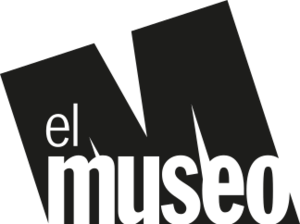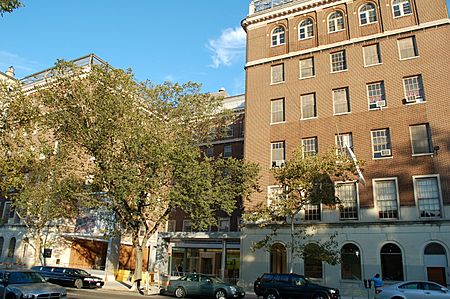El Museo del Barrio facts for kids
 |
|
 |
|
| Established | 1969 |
|---|---|
| Location | 1230 Fifth Avenue, Upper Manhattan, New York, NY |
| Type | Art, Cultural |
| Public transit access | Subway: Bus: M3, M4, M102, M116 |
El Museo del Barrio, also called El Museo, is a special museum in New York City. You can find it on Fifth Avenue in Upper Manhattan. It's part of the famous Museum Mile, right next to the Museum of the City of New York.
El Museo started in 1969. It focuses on Latin American and Caribbean art. A big part of its collection shows art from Puerto Rico and the Puerto Rican community in New York City. It is the oldest museum in the United States dedicated to Latino art.
Contents
Exploring the Art Collection
The museum has a huge permanent collection with over 6,500 pieces of art. This collection covers more than 800 years of art from Puerto Rico, Latin America, the Caribbean, and Latino art.
What You Can See
- Ancient Art: You can see very old pre-Columbian items made by the Taíno people.
- Traditional Crafts: There are traditional arts like Puerto Rican Santos de palo (carved wooden saints) and Vejigante masks.
- Modern Works: The museum also has drawings, paintings, sculptures, and art installations from the 1900s. You'll also find prints, photos, and videos.
- Changing Exhibits: They often have temporary shows that feature modern art from Puerto Rico and other Latino artists.
The museum also hosts many festivals and learning programs all year. One popular event is the yearly Three Kings Day parade. Before a big expansion in 2009-2010, the museum started putting some of its permanent collection online. This helped more people see the art.
Growing the Collection
El Museo works with other groups to share art and reach more people. For example, they partnered for exhibits like Nueva York with the New York Historical Society. They also worked on Caribbean Crossroads with the Queens Museum of Art and the Studio Museum in Harlem.
The museum is always adding to its permanent collection. They are getting more Modernist and Contemporary works. They also want to make their collections of graphic art and Taíno items even stronger.
Museum History
El Museo del Barrio began in 1969. It was a time when people were fighting for civil rights and cultural recognition.
Why the Museum Started
Parents, teachers, and community leaders in Central and East Harlem (also known as El Barrio) were worried. They felt that city schools did not teach enough about different cultures. They wanted their children to learn about their diverse backgrounds, especially Puerto Rican heritage.
In response, William W. Frey, a school superintendent, asked artist and educator Rafael Montañez Ortíz for help. Ortíz was asked to create materials for schools that would show Puerto Rican art, history, and culture. However, Ortíz quickly decided to create a community museum instead. He named it El Museo del Barrio.
Early Days and Goals
Ortíz explained that he founded the museum because he felt disconnected from his own Puerto Rican culture in traditional museums. He wanted a place where he and others could connect with their heritage. He was the museum's director from June 1969 to spring 1971.
The museum started in a public school classroom. It aimed to be a place for learning. Today, Puerto Ricans are still the largest Latino group in New York City. As the museum has grown, some artists and community members want to make sure it stays true to its original purpose.
Challenges and Growth
In 1977, El Museo joined the Cultural Institutions Group (CIGs). This helped them get more funding. In the 1980s, their funding was stopped for a while due to problems with how it was managed. But the museum recovered and grew stronger.
In 2002, a special exhibit about Frida Kahlo brought in more visitors than the museum usually saw in a whole year. This helped change how people viewed the museum. It also led to the museum's first director who was not Puerto Rican.
In 2009, El Museo celebrated its 40th anniversary. They had public events and finished a big renovation. This included new space for their permanent collection, a cafe, and a redesigned courtyard.
El Museo has grown from a small community space to an important museum in East Harlem. It has also expanded its focus from only Puerto Rican art to include Latino, Caribbean, and Latin American art and culture.
Supporting Women Artists
In 2015, El Museo noticed that women artists were not shown enough in museum exhibits. So, they decided to hold a major show featuring a woman artist every year. These shows would take up most of the museum's space and include public programs and publications. The first such exhibit was dedicated to the work of Gloria Rodriguez Calero.
Museum Location
El Museo has been in several places since it started in a school classroom.
Moving Around
From 1969 to 1976, the museum operated out of different storefronts on Third and Lexington Avenues. These locations were right in the heart of the community it served.
In 1977, El Museo moved to its permanent home. This was the neo-classical Heckscher Building on Fifth Avenue. In 1978, it became a founding member of Museum Mile. Being in this new location helped the museum grow and attract more visitors. About 40% of their visitors were not Latino.
Nearby, a non-profit called Música de Cámara was started at the museum in 1979 by Eva de la O. This group helps promote Latin classical musicians.
Museum Expansion
In the early 2000s, more and more people visited the museum. However, it was still limited to one floor in its building, which it shared with a school and other groups.
Plans for Growth
There was a plan for the Museum of the City of New York, which was across the street, to move to a different building. El Museo would then have moved into that museum's old building, giving it much more space. However, Mayor Michael Bloomberg decided to use that building for the new New York City Department of Education instead.
Renovations and New Spaces
After the plan to move fell through, El Museo decided to renovate its own building. They started a $15 million project to turn their outdoor courtyard into a glass lobby, cafe, and performance area. This would give the museum a welcoming "face" to the street, similar to the renovated Brooklyn Museum.
The renovation cost $35 million and was led by architect Gruzen Samton. The museum reopened in October 2009 to positive reviews. It now included a shop and a restaurant.
From 2018 to 2019, the museum's theater, called the Teatro, was restored. Its fairytale paintings were redone, the seats were changed, and the stage was updated. Two beautiful chandeliers were hung from the ceiling again. The museum celebrated these improvements with a concert by the famous musician Eddie Palmieri on February 20, 2021.
Museum Leadership
The museum has had several leaders over the years.
On February 15, 2013, Margarita Aguilar left her role as director. Jorge Daniel Veneciano, the next director, stepped down in August 2016. In 2017, Patrick Charpenel became the museum's executive director. He has a lot of experience working with art in Mexico and around the world.
See also
 In Spanish: El Museo del Barrio para niños
In Spanish: El Museo del Barrio para niños
- List of museums and cultural institutions in New York City
- Education in New York City
 | Audre Lorde |
 | John Berry Meachum |
 | Ferdinand Lee Barnett |

